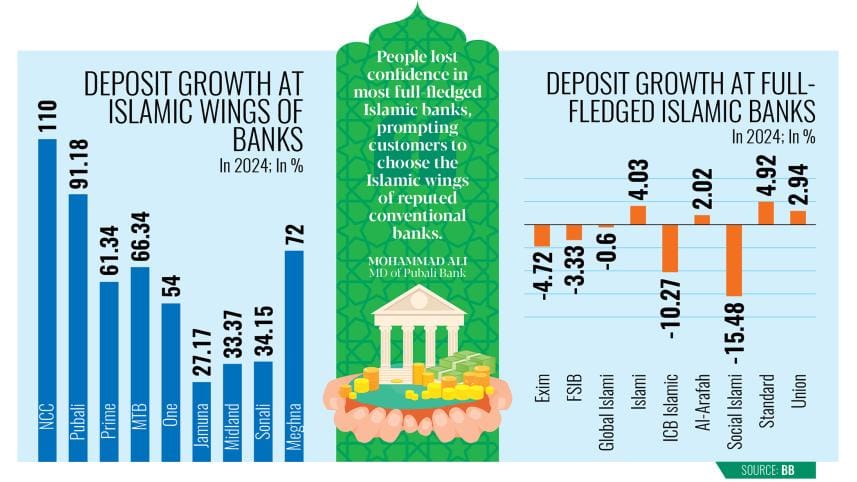Islamic banks witness deposit shift

Islamic wings of conventional banks have become the preferred choice for religiously inclined depositors as many full-fledged Shariah-based banks struggle with a crisis of trust.
This shift has emerged after controversies and financial scandals involving Shariah-based banks, many of which were controlled by the controversial conglomerate S Alam Group during the previous regime.
Although the boards of these banks were reshuffled after the political changeover in August last year, industry insiders say rebuilding public trust will take time.
At the end of 2024, deposit growth in the banking sector slowed to 7.47 percent. However, 18 banks experienced deposit surges exceeding 26 percent, with some Islamic wings of conventional banks registering increases of more than 100 percent.
A senior central bank official told The Daily Star that certain conventional banks and their Islamic wings successfully drew in large deposits that had been withdrawn from about half a dozen struggling lenders.
As financial irregularities at commercial banks linked to S Alam Group came under scrutiny, savers moved their funds to banks with stronger financial standing and reputations, he added.
In 2024, deposits at National Credit and Commerce (NCC) Bank rose by only 13.04 percent to Tk 25,410 crore. However, deposits in its Islamic wing soared by a record 110 percent, the highest in the banking sector.
"Public confidence in some banks was severely shaken last year, which contributed to our strong deposit growth," said M Shamsul Arefin, managing director of NCC Bank.
He told The Daily Star that as customers of certain Shariah-based banks struggled to withdraw their savings, many sought alternative Shariah-compliant options. This trend significantly benefited the Islamic banking units of conventional banks.
"NCC Bank is financially sound and is expanding its Islamic banking operations to cater to the rising demand for Shariah-based financial services," Arefin added.
Similarly, at the end of last year, Pubali Bank's total deposits stood at Tk 70,637 crore. While the bank recorded a 21 percent deposit growth overall, its Islamic wing saw a 91.18 percent rise.
"Many depositors lost trust in full-fledged Islamic banks, prompting them to turn to the Islamic wings of established conventional banks," said Mohammad Ali, managing director of Pubali Bank.
"Our Shariah compliance is very high, which has helped strengthen confidence in our Islamic banking operations," he added.
Another example is Prime Bank, which saw total deposits grow by 12.74 percent last year while deposits with its Islamic wing ballooned by 61.34 percent.
Along that same vein, the Islamic wing of Mutual Trust Bank saw deposit growth of 66.34 percent and One Bank's Islamic wing recorded a 54 percent increase, according to central bank data.
Hassan O Rashid, managing director of Prime Bank, said that the expansion of Islamic banking deposits in Bangladesh is driven by high demand, supportive policies and unique sectoral features such as risk-sharing, financial inclusivity and asset-backed transactions.
"These attributes align with religious principles and provide financial security," said Rashid.
Prime Bank was the first conventional bank in Bangladesh to introduce Islamic banking, launching such services through five dedicated branches in 1995.
"Our 30 years of expertise in Islamic banking, coupled with Prime Bank's financial strength, digital banking approach, timely deposit offerings and well-trained branch officials, have contributed to this growth," Rashid added.
Jamuna Bank recorded a 26.31 percent overall deposit growth last year, with deposits with its Islamic wing growing by 27.17 percent.
"Full-fledged Shariah-based banks are experiencing a temporary crisis of confidence, leading to the strong deposit growth in Islamic wings within conventional banks," said Mirza Elias Uddin Ahmed, managing director of Jamuna Bank.
He added that profit rates in the Islamic wings of conventional banks tend to be higher than those of Shariah-based banks, which has also contributed to the influx of depositors.
"This strong deposit growth has significantly improved our liquidity position," Ahmed said.
Midland Bank recorded an overall deposit increase of 29.77 percent last year, while its Islamic wing recorded a 33.37 percent deposit growth.
Ahsan-Uz Zaman, managing director and CEO of Midland Bank, told The Daily Star that public trust in the bank is growing because it tailors financial products to client needs.
"People now feel more secure entrusting their savings to Midland Bank, which has contributed to our deposit growth," he said.
Last year, deposit growth in the Islamic banking wings of other banks included Sonali Bank at 34.15 percent, Mercantile Bank at 29.15 percent, SBAC Bank at 28.69 percent, Trust Bank at 35 percent, City Bank at 20.40 percent, Meghna Bank at 72 percent, and UCB at 27 percent, according to central bank data.
In contrast, weak and troubled banks, including several Shariah-based ones, saw deposit declines last year. BASIC Bank, Janata Bank, AB Bank, Bangladesh Commerce Bank, EXIM Bank, First Security Islami Bank, ICB Islamic Bank, National Bank, Padma Bank, and Social Islami Bank all reported negative deposit growth.




 For all latest news, follow The Daily Star's Google News channel.
For all latest news, follow The Daily Star's Google News channel.
Comments